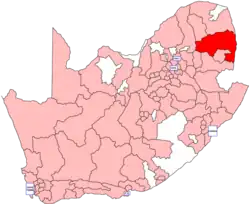Lydenburg (House of Assembly of South Africa constituency)
| Lydenburg | |
|---|---|
| Former constituency for the South African House of Assembly | |
 Location of Lydenburg within South Africa (1981) | |
| Province | Transvaal |
| Electorate | 16,925 (1989) |
| Former constituency | |
| Created | 1910 |
| Abolished | 1994 |
| Number of members | 1 |
| Last MHA | A. A. B. Bruwer (CP) |
| Replaced by | Mpumalanga |
Lydenburg, known as Lydenburg-Barberton between 1958 and 1966, was a constituency in the Transvaal Province of South Africa, which existed from 1910 to 1994. Named after the town of Lydenburg, it covered a rural area in the eastern Transvaal. Throughout its existence it elected one member to the House of Assembly and one to the Transvaal Provincial Council.
Franchise notes
When the Union of South Africa was formed in 1910, the electoral qualifications in use in each pre-existing colony were kept in place. In the Transvaal Colony, and its predecessor the South African Republic, the vote was restricted to white men, and as such, elections in the Transvaal Province were held on a whites-only franchise from the beginning. The franchise was also restricted by property and education qualifications until the 1933 general election, following the passage of the Women's Enfranchisement Act, 1930 and the Franchise Laws Amendment Act, 1931. From then on, the franchise was given to all white citizens aged 21 or over. Non-whites remained disenfranchised until the end of apartheid and the introduction of universal suffrage in 1994.[1]
History
Like most of the rural Transvaal, Lydenburg had a largely Afrikaans-speaking electorate. In its early years, it was a marginal seat with a slight lean towards the South African Party, but over time it became more and more conservative and safe for the National Party, which held it from 1953 until 1989. Its final Nationalist MP, P. T. C. "Pietie" du Plessis, served in cabinet under P. W. Botha. He resigned from parliament in 1989, partly due to a growing financial scandal that would eventually see him convicted of fraud and sentenced to prison in 1993, and in its final election the seat was won by the hard-right Conservative Party.
Members
| Election | Member | Party | |
|---|---|---|---|
| 1910 | C. J. J. Joubert | Het Volk | |
| 1915 | J. L. Schurink | South African | |
| 1920 | |||
| 1921 | Jacobus Nieuwenhuize | ||
| 1924 | |||
| 1929 | Elias de Souza | National | |
| 1933 | |||
| 1934 | United | ||
| 1938 | N. J. Schoeman | ||
| 1943 | F. J. Maré | ||
| 1948 | J. L. V. Liebenberg | Afrikaner | |
| 1953 | National | ||
| 1958 | E. C. A. Hiemstra | ||
| 1961 | |||
| 1966 | J. J. P. Erasmus | ||
| 1970 | P. T. C. du Plessis | ||
| 1974 | |||
| 1977 | |||
| 1981 | |||
| 1987 | |||
| 1989 | A. A. B. Bruwer | Conservative | |
| 1994 | Constituency abolished | ||
Detailed results
Elections in the 1910s
| Party | Candidate | Votes | % | ±% | |
|---|---|---|---|---|---|
| Het Volk | C. J. J. Joubert | Unopposed | |||
| Het Volk win (new seat) | |||||
| Party | Candidate | Votes | % | ±% | |
|---|---|---|---|---|---|
| South African | J. L. Shurink | 1,384 | 68.0 | N/A | |
| National | S. Hiemstra | 651 | 32.0 | New | |
| Majority | 723 | 36.0 | N/A | ||
| Turnout | 2,035 | 71.4 | N/A | ||
| South African hold | Swing | N/A | |||
Elections in the 1920s
| Party | Candidate | Votes | % | ±% | |
|---|---|---|---|---|---|
| South African | J. L. Shurink | 986 | 56.0 | −12.0 | |
| National | F. P. Hoogenhout | 776 | 44.0 | +12.0 | |
| Majority | 210 | 12.0 | −24.0 | ||
| Turnout | 1,762 | 63.5 | −7.9 | ||
| South African hold | Swing | -12.0 | |||
| Party | Candidate | Votes | % | ±% | |
|---|---|---|---|---|---|
| South African | Jacobus Nieuwenhuize | 1,003 | 54.5 | −1.5 | |
| National | F. P. Hoogenhout | 836 | 45.5 | +1.5 | |
| Majority | 167 | 9.0 | −3.0 | ||
| Turnout | 1,839 | 64.2 | +0.7 | ||
| South African hold | Swing | -1.5 | |||
References
- ^ "EISA South Africa: Historical franchise arrangements". Eisa.org.za. Archived from the original on 9 May 2013. Retrieved 6 July 2012.
- ^ Schoeman, B.M. (1977). Parlementêre verkiesings in Suid-Afrika 1910-1976. Pretoria: Aktuele Publikasies.
- ^ Standard Encyclopaedia of Southern Africa (1972). "House of Assembly" (vol. 5, pp. 617–636). Cape Town: Nasionale Opvoedkundige Uitgewery (Nasou).
- ^ South Africa 1980/81: Official Yearbook of the Republic of South Africa. Johannesburg: Chris van Rensburg Publications.
- ^ South Africa 1983: Official Yearbook of the Republic of South Africa. Johannesburg: Chris van Rensburg Publications.
- ^ Government Gazette of South Africa, No. 10751. 22 May 1987. Pretoria: Government of South Africa.
- ^ Government Gazette of South Africa, No. 12109. 20 September 1989. Pretoria: Government of South Africa.